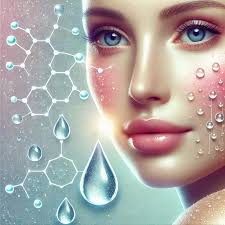
Can I Use Hyaluronic Acid and Peptides Together? Here’s What You Need to Know
In the world of skincare, few ingredients have reached hero status quite like hyaluronic acid and peptides. Each offers impressive benefits for your skin—but what happens when you use them together?
The good news? They make an excellent pair.
This blog post will guide you through everything you need to know about these two powerhouse ingredients—how they work, how to use them, what not to mix them with, and what results you can expect.
What Is Hyaluronic Acid?
Hyaluronic acid (HA) is a naturally occurring substance found in your body, mainly in the skin, eyes, and joints. In skincare, it’s used for one very good reason—hydration.
Hyaluronic acid is a humectant, meaning it attracts and holds onto water, helping to keep the skin plump and supple. It can hold up to 1,000 times its weight in water.
Skin Benefits of Hyaluronic Acid
Hydrates the skin deeply, locking in moisture to keep it soft and bouncy.
Improves skin texture and helps reduce roughness and dry patches.
Reduces the look of fine lines and wrinkles caused by dehydration.
Supports skin cell renewal, giving the complexion a healthy glow.
Calms redness and irritation, helping sensitive skin types stay balanced.
Brightens dull skin, improving clarity and evening out skin tone.
Strengthens the skin barrier, protecting against pollution and UV damage.
Whether your skin is dry, oily, sensitive, or aging, hyaluronic acid is an ingredient that almost everyone can benefit from.
What Are Peptides?
Peptides are short chains of amino acids that are the building blocks of proteins like collagen, elastin, and keratin—all of which are vital for healthy, youthful-looking skin.
Peptides naturally occur in the body, but topical application can stimulate skin repair and rejuvenation, making them a key ingredient in many anti-aging products.
Skin Benefits of Peptides
Stimulate collagen and elastin, giving the skin firmness and bounce.
Tighten sagging skin and reduce the appearance of fine lines and wrinkles.
Improve the skin barrier, making it more resistant to external damage.
Soothe inflammation, helping calm redness and irritation.
Support skin healing, making them great for post-acne or damaged skin.
Protect against environmental stressors, like UV rays and pollution.
Fight bacteria, especially helpful for acne-prone skin due to antimicrobial properties.
Peptides are often found in serums, creams, and eye products, where their regenerative powers are most effective.
Can You Use Hyaluronic Acid and Peptides Together?
Yes, you can—and you should. Using hyaluronic acid and peptides together can supercharge your skincare routine without risking irritation or sensitivity.
Why They Make the Perfect Pair
Both support the skin barrier, helping the skin stay hydrated and resilient.
HA draws in moisture, while peptides help lock it in and rebuild damaged skin.
Peptides work deep in the skin, stimulating collagen, while HA keeps the surface hydrated and smooth.
Using HA with peptides can enhance absorption and effectiveness, especially when applied to damp skin.
Together, they offer a powerful combination for hydration, anti-aging, and skin repair—without the risk of irritation.
How to Layer Hyaluronic Acid and Peptides
To get the best results from these two ingredients, it’s important to apply them in the right order.
Morning Routine
Cleanse your skin with a gentle, non-stripping cleanser.
Apply hyaluronic acid serum to slightly damp skin to draw in hydration.
Follow with a peptide serum or moisturizer to lock in moisture and strengthen the skin.
Finish with moisturizer and a broad-spectrum SPF 30+ sunscreen.
Evening Routine
Cleanse thoroughly to remove dirt and sunscreen.
Apply HA serum to hydrate and prep the skin.
Use your peptide serum or cream to promote overnight repair.
Seal in your routine with a night cream or facial oil.
Always remember the golden rule of layering: apply products from thinnest to thickest consistency.
What Can You Not Mix with Peptides?
While peptides are gentle and versatile, there are some combinations to avoid—especially with strong exfoliating acids.
❌ Avoid Mixing Peptides With:
Glycolic acid, Lactic acid, Salicylic acid, Other AHAs and BHAs
Why? These acids can break down the bonds in peptides, reducing their effectiveness and sometimes causing irritation. If you want to use both, alternate them in your routine.
You Can Mix Peptides With:
Hyaluronic acid, Ceramides, Retinol (yes, really!), Niacinamide, Vitamin C (if your skin tolerates it)
Interestingly, peptides can help buffer stronger actives like retinol, making your routine more balanced and comfortable.
What Can You Not Mix with Hyaluronic Acid?
Hyaluronic acid is one of the most forgiving and flexible skincare ingredients. It pairs well with almost everything.
The only real concern is overusing it.
Overusing Hyaluronic Acid?
Yes, applying too much HA without enough moisture in the environment or on the skin can actually pull water out of the deeper layers of your skin, making dryness worse.
To avoid this:
Always apply HA to damp skin.
Follow with a moisturizer to seal it in.
Don’t layer multiple HA products unless your skin truly needs it.
How Long Do Peptides Take to Work?
You may notice some immediate hydration and smoothness, but peptides are long-game ingredients.
First 1–2 weeks: Skin may look more hydrated and calm.
4–6 weeks: Fine lines may begin to soften; skin appears firmer.
3–6 months: Collagen stimulation kicks in, with visible anti-aging results.
Consistency is key—peptides work best when used twice a day, every day.
How Do You Incorporate Peptides into Your Routine?
Peptides are usually found in serums and moisturizers, and should be applied after cleansing and any water-based serums (like hyaluronic acid).
Application Tips:
Use peptides morning and evening for best results.
Apply to clean, slightly damp skin for better absorption.
Follow with your regular moisturizer and SPF (in the daytime).
Combine with retinol or vitamin C if targeting aging or pigmentation (but patch test first!).
Do Peptides Tighten the Skin?
Yes, they do. Peptides stimulate collagen production, which in turn tightens and firms the skin over time.
This leads to improvements in:
Loss of elasticity
Sagging jawlines
Fine lines and wrinkles
Thinner, crepey skin
For extra firming results, team peptides with retinol or vitamin C, and apply your skincare in upward motions to counteract the pull of gravity.
Final Thoughts: Should You Use Hyaluronic Acid and Peptides Together?
Absolutely. Hyaluronic acid and peptides are a dream team for anyone looking to improve hydration, elasticity, and overall skin health.
Here’s why the combination works so well:
Both ingredients are gentle and non-irritating.
They work on different layers of the skin, creating a complete skincare solution.
Together, they improve hydration, texture, firmness, and barrier strength.
Summary at a Glance
Ingredient Key Benefits Mixes Well With
Hyaluronic Acid Deep hydration, plumps fine lines Almost everything!
Peptides Firming, collagen-boosting, anti-aging HA, retinol, niacinamide
Still have questions? Want to see product suggestions or skincare routines for your skin type? Let me know and I’d be happy to help tailor a routine just for you.
And don’t forget—follow us on Instagram for more skincare tips, ingredient breakdowns, and behind-the-scenes content!


